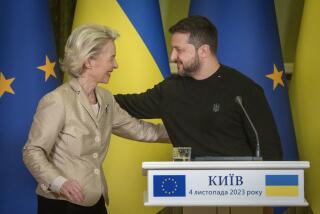5 Soviet Republics May Spurn Gorbachev Pact : Nationalism: Despite warning of unspeakable bloodshed, fissures continue to multiply.
- Share via
MOSCOW — Despite President Mikhail S. Gorbachev’s warning that the breakup of the Soviet Union may lead to unspeakable bloodshed, as many as five republics could spurn the treaty he is proposing as a way to hold the country together, top Kremlin officials acknowledge.
As fissures continue to multiply in the once-monolithic Soviet state, with a nationalist firebrand being elected Georgia’s president Wednesday, government and Communist Party leaders are pondering the costs and benefits of a new union treaty. The costs include the possible loss of lands with a total population of 18 million and an area two-thirds of California’s.
Spurred by demands from alarmed lawmakers, Gorbachev agreed Wednesday to report to the nation’s legislature on the country’s economic crisis and his vision of a new federal or confederation arrangement. He is to address the Supreme Soviet on Friday.
By last summer, it had become clear in Moscow that the three formerly independent Baltic republics--Lithuania, Latvia and Estonia--would decline anything less than full restoration of statehood. But events in recent weeks have given officials serious doubts about two more of the 15 Soviet republics, Georgia and Moldova.
“To date there are at least 11 constituent republics which are in favor of the union,” Grigory I. Revenko, a member of Gorbachev’s Presidential Council, or personal cabinet, said in an interview this week. “Why have I given this number? Because elections recently held in Georgia do not give grounds to predict the political orientation of the new leaders.”
Moldova, formerly Moldavia, has been Balkanized by ethnic disputes into three separate regions, and the actions of the nationalist government in Kishinev now cannot be predicted, said Vyacheslav A. Mikhailov, chief of the Communist Party Central Committee’s Department on Nationality Policy. Locally, there is a strong current of support for eventual reunification with Romania, with which Moldova shares a common language and heritage.
The refusal of the five republics to sign a treaty replacing the 1922 document that created the heavily centralized Union of Soviet Socialist Republics would deprive the new formation of only a small part of the U.S.S.R.’s huge territory and population of 290 million. But the lands in question boast some of the nation’s most fertile farming areas and efficient industries.
Perhaps most important, any refusal to join the new federation would increase pressure on nationalists in the other republics to demand more independence for their lands as well.
Revenko said the most populous Soviet republics, the Russian Federation and the Ukraine, now support the idea of a new union arrangement, but it is also true that both attach strings to their participation that would make anything like the present-day Soviet Union impossible.
The Ukraine, where a powerful grass-roots nationalist movement is demanding independence, wants to write a new constitution to define its own responsibilities before agreeing to a union treaty.
Russia’s populist leader, Boris N. Yeltsin, this week demanded from Gorbachev the right to name the Soviet prime minister and has suggested such a devolution of the central government’s functions that Gorbachev would be reduced to being a virtually symbolic head of state, like Britain’s Queen Elizabeth II.
Mikhailov, speaking at Central Committee headquarters, said the Kremlin leadership’s formal “concept” of the new union treaty should be made public in the media by this Sunday. But the independent Baltic News Service said an unofficial copy of the draft treaty had already been leaked in Lithuania and that Baltic officials found it too traditional.
“Essentially, the draft does not give any hopes that the relationship between the republics and the center will change,” the Baltic News Service commented.
The 24-article treaty, which would be in effect for 50 years after signing, reportedly reserves foreign policy, defense and national security, financial policy and foreign trade for the central government of the “Union of Sovereign States”--provisions that run counter to the aspirations of some republics.
More than 60 million Soviet citizens live outside their titular homeland--for example, ethnic Russians in Kazakhstan--but Gorbachev this week said any attempts to create separate states along purely ethnic lines would have consequences more terrible than China’s Cultural Revolution.
“This Union of Sovereign States is, to use a military term, the last trench,” Gorbachev said Tuesday. “Beyond that, the collapse of the state begins. Attempts to divide peoples who have lived together for centuries could end in a blood bath.”
Elsewhere Wednesday, the Parliament in the Transcaucasus republic of Georgia elected anti-Communist Zviad Gamsakhurdia as the republic’s president, elevating the former dissident and political prisoner to the highest office in the land.
More to Read
Sign up for Essential California
The most important California stories and recommendations in your inbox every morning.
You may occasionally receive promotional content from the Los Angeles Times.










